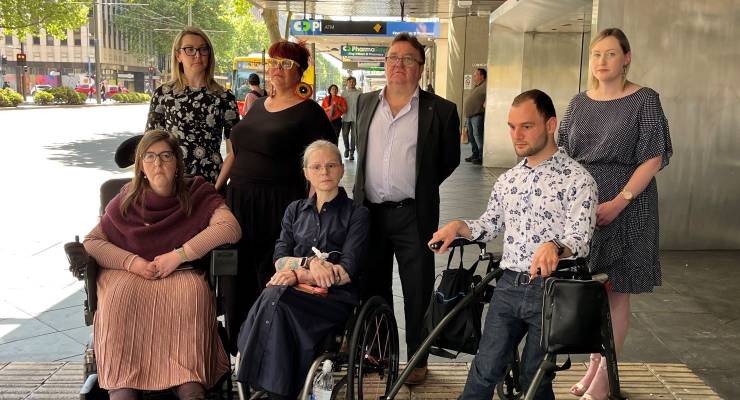
It has only been a few days since the disability royal commission’s final report landed, and already the horrifying violence, abuse, neglect and exploitation against disabled people that was uncovered has disappeared from view.
Those who perpetrate this violence — disability support workers, prison guards, people working in hospitals and schools, police, doctors, nurses — and all those who purport to love and care for us have disappeared with it. The abuse we experience seems to arrive from outer space.
Instead of focusing on the abuse victims, media coverage continues to concentrate on the imagined fretting of non-disabled people, that they may have to change a tiny part of their lives in order to ensure disabled people are kept safe.
The disability royal commission handed down its 12 volumes on Friday, after four and a half years of public and private hearings, submissions and research into what is happening to disabled people and how the abuse can be stopped.
In its third volume, the commission clearly set out the scale of the violence against us. More than half of us have experienced physical or sexual abuse — a far higher rate than experienced by non-disabled people (38%). We are more than twice as likely to be hurt by our intimate partners. The report details the data and research, listing statistic after statistic, known for years, about how much we are harmed by those around us.
Different disabled people have different experiences of violence, abuse, neglect and exploitation. Women with disabilities are more likely to be sexually assaulted; people with a head injury or an intellectual disability have the highest rates of violence; First Nations peoples with disabilities experience all the disadvantages of both First Nations and disability communities.
The royal commission is also explicit about what the risks are for disabled people experiencing violence and abuse, including being socially isolated and the need for high levels of support. The report makes clear that “institutional and segregated settings may increase the risk of social isolation and barriers to making complaints”.
None of this is unknown, yet it makes for sobering reading, seeing all those statistics, that data, that research, showing so clearly what is happening to far too many of us.
The commissioners made 222 recommendations, unanimous in nearly all of their findings, calling for change across all levels of government and in the community. They were unified in saying that disabled people in this country are not equal and are disproportionately harmed, and that this must be addressed. But of course, what is happening to us — these statistics, the stories in the reports, and the overwhelming consensus on what needs to change — isn’t what’s being reported on. Instead, the media has focused on the seven recommendations where the commissioners had conflicting views.
When it came to group homes, chair Ronald Sackville and commissioner John Ryan sat through a week of horror in public hearing three, listening to evidence about the devastating abuse of mostly people with an intellectual disability by those who were paid to support them, and still decided that group homes should continue. They sat through public hearing after public hearing into specific group homes, run by disability services providers, where disabled people were hurt, assaulted, neglected and injured, again, by the very people paid to support them.
Yet they still couldn’t add their names to Recommendation 7.43, which called for a roadmap to phase out group homes within 15 years, with Ryan not recommending a timeline and Sackville not saying anything.
The same happened with education. Despite clear evidence of the links between being educated separately from peers and thus going on to a separate life in work and housing, a number of public hearings, and evidence from young people with disabilities about the harms done, the chair and commissioners Ryan and Mason still couldn’t support the recommendation for change over the next few decades.
In employment, despite hearing evidence from disabled people about the impact of being paid a few dollars an hour, being bullied at work, and living in poverty, not all commissioners agreed on the need for change.
Recommendation 7.32, supported by the majority of commissioners, called for an end within 10 years to paying disabled people as little as $2.90 per hour for their work, as well as an end to insisting people with disabilities work separately from everyone else. Commissioners called for Australian Disability Enterprises, formerly sheltered workshops, to open up to people with an intellectual disability, who, the commissioners suggested, should have more opportunities to work in the same places everyone else does.
These areas of disagreement are hardly radical or new proposals. The disability rights movement, including people with an intellectual disability, have been demanding to be seen as equal, to live and work in the community alongside everyone else, for decades.
We are hurt and harmed in the hidden places, in the dark, and by the systems and people who want to keep us there. The disability royal commission has been clear about what needs to change so we can be free from this scourge of abuse and violence. The work now begins to realise those changes.








Perhaps disabled kids should be incorporated into the elite private schools, no shortage of (government funded) resources there, and no shortage of latin maxim platitudes about improving humanity in their marketing brochures.
Absolutely. If we’re going to fund these elite private schools as we do currently with our taxes, they need to provide services we value instead of just running a business at our expense. They have the facilities, the resources and the teachers to give kids at all levels of ability high levels of service. However, sadly in my experience, they neglect those with high needs, instead focussing on the highest performers so that they can market their school as a high performing school. As a result, they avoid taking on kids with high needs wherever they can.
Unfortunately phasing things out with no clear pathway for improvements in results is no magic solution. The systems in place now replaced worse systems where everything was left to family members leaving people very vulnerable indeed when parents worn out with care succumbed and died.
Children in mainstream schools were ridiculed, had no friends and were endlessly bullied. More than ‘phasing out ‘is needed. And what of the disabled people who like to have contact with others like themselves? The reported disagreements are about frumentai and philosophical differences focused on abuse. And then there was the Adelaide woman whose parents provided a home for her and care at home who died a miserable lonely death through abuse.
Good points made here. Some disabled people were completely isolated and shut away from the world and other people from birth. They were imprisoned in their homes by parents afraid of the community that stigmatised and attacked them for having these children. We need to change attitudes and behaviour of the entire community to have a better focus on equity, kindness and compassion to enable willingness to support others, if only we had politicians who led the way in supporting the most vulnerable, instead of demonstrating selfish greedy behaviour and pandering to the most powerful.
Wouldn’t it be good if people woke up to the fact that we all need support in some way at some time, so when we’re strong and capable we can support others to build a community where we all take turns in helping each other. Everyone needs help on some things, so we really can work to be interdependent so that everyone thrives.
Agree with others about the need to provide choices, since we know mainstream schools can be bully places – I am always trying to influence my sons but the influence of peers and social media has been just as strong if not a stronger influence on them.
It is timely to have the Disability Royal Commission’s recommendations for the NDIS Review and reforms of aged care. For the NDIS Review, I hope we will see less of people being pushed toward group housing (unless you’re prepared to go to the AAT to dispute their decision) as these are the places I see and hear things that could be viewed as abuse, but are also an issue of resources to respond to people’s care needs in a timely manner. It is complex as I know people who live alone and can’t get consistent cares at night.
If we want better disability and aged care, we need more resources, and greater respect for the industry and what it gives back to us, to give it the same importance as health or defence in our national conversation since it affects us all.
Yes, we will all need support at some time in our lives, whether physical or mental. It makes sense to ensure that good support is available to all, so that if or when we are struggling or disabled in some way, we’re not at the mercy of exploitative abusers. This also means ensuring supervision of service providers.
The small number of comments on this story suggests that many people are not interested in this issue, because they don’t think it’s relevant to them. They would be wrong. No-one is totally independent all of the time. We all need other people and society as a whole to support us. Everyone has strengths and weaknesses, abilities and disabilities. We’re all affected by disability at some time in our lives, whether temporarily or on a lifelong basis. Getting older brings disability to most, as does illness and accident, so even if you’re not born with a disability it will come your way at some time.